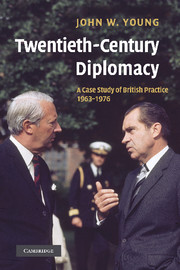Book contents
10 - Conclusion
Published online by Cambridge University Press: 30 June 2009
Summary
If you ask any of the nibs who move in diplomatic circles and are accustomed to handling tricky affairs of state, he will tell you that when matters have reached a deadlock, it is not a bit of good just sitting on the seat of the pants and rolling the eyes up to heaven – you have got to turn stones and explore avenues and take prompt steps through the proper channels.
Bertie WoosterWith a few exceptions, diplomatic practice, or the way diplomacy is actually put into effect, has escaped close scrutiny, for any country in any era. Nevertheless, the limited work that has been done suggests that it is a vast subject to be tapped. This study has tried to shed light on the way one country organised its diplomacy to achieve foreign policy aims in a particular time frame. While British diplomatic practice in the 1960s and 1970s is a closely defined topic, it allows comparisons to be drawn between different countries and time periods to gain a much fuller understanding of the subject. The book has shown that, even in this short period, diplomatic practice evolved in important ways and in several directions. London adapted its diplomatic methods to suit particular challenges as it searched for a new role in the wake of Empire. The Diplomatic Service was reformed, with an emphasis on supporting exports, and institutional change was carried through, notably through the creation of the Foreign and Commonwealth Office.
- Type
- Chapter
- Information
- Twentieth-Century DiplomacyA Case Study of British Practice, 1963–1976, pp. 226 - 228Publisher: Cambridge University PressPrint publication year: 2008



